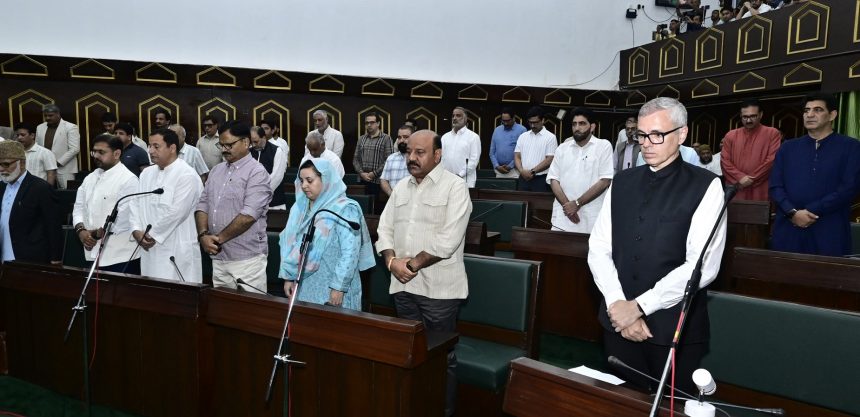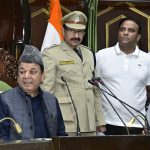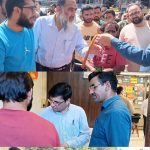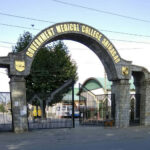JAMMU, APR 28 : Chief Minister Omar Abdullah on Monday made an emotional and resolute statement before the Jammu and Kashmir Legislative Assembly, saying that he would not de-mand statehood for Jammu and Kashmir in the name of the 26 civilians killed in the recent Pa-halgam terror attack.
“After Pahalgam, with what face can I ask for statehood for Jammu and Kashmir? Meri kya itni sasti siyasat hai?” the Chief Minister asked during the special Assembly session convened to mourn the April 22 attack. “I have too much respect for the sanctity of these 26 lives to indulge in petty politics. I will not exploit their martyrdom for political gain.”
Abdullah emphasised that the time for political discussions on statehood would come later. “We have talked about statehood with the Centre in the past, and we will continue to talk about it in the future, but not right now. This time, there will be no politics on anything except condemning the terror act and expressing solidarity with the families who lost their loved ones,” the Chief Minister stated.
The attack, carried out in Baisaran near the tourist town of Pahalgam, killed 26 people, most of them tourists from across the country. It was one of the deadliest incidents in the Valley in more than two decades.
In a deeply moving speech, Abdullah began by reflecting on the sombre setting of the Assembly. “Just a few days ago, we were debating the Budget in this House. None of us imagined we would be meeting again under such tragic circumstances.”
Expressing gratitude to the Lieutenant Governor for convening the special session, he said no other legislature in the country could understand this grief more intimately. “This House has suf-fered before — from the October 1, 2001 Assembly attack, and through the personal losses of members like Shagun Parihar, Sakina Itoo, and Sajad Lone. Pandit settlements, Sikh colonies – no one was spared. We thought those days are gone now. But April 22 attack recreated the night-mare, “Omar spoke about the heavy cost Kashmir has borne over the past three decades.
The Chief Minister recalled visiting the police control room on the night of the attack, where the bodies of 26 civilians lay. He said he had no words to offer the grieving families. “What was the fault of these families?” he asked, pausing briefly. “That they had come here for the first time to find some peace? And life made them pay such a heavy price?”
Abdullah, who also holds the Tourism portfolio, took personal responsibility for failing to protect the visiting tourists. “As the host, it was my duty to ensure their safe return. I couldn’t do it. What apology would ever suffice?”
The Chief Minister recalled visiting the police control room on the night of the attack, where the bodies of 26 civilians lay. He said he had no words to offer the grieving families. “What was the fault of these families?” he asked, pausing briefly. “That they had come here for the first time to find some peace? And life made them pay such a heavy price?” Recounting his interaction with grieving families, he shared the words of a newlywed woman who had lost her husband: “We just came for the holidays. What was our fault?” He added, “Who among us could ever ask for such violence? No one—not in this House, not outside it.”
Despite the devastation, Abdullah found a silver lining in the spontaneous public outpouring of condemnation from across the Valley. “From Kathua to Kupwara, people raised placards that read ‘Not In My Name,’ rejecting terrorism without political prompting. That, to me, is a ray of hope.”
“For the first time in twenty-six years, I saw the people of Jammu and Kashmir stand up and say, ‘Not in my name.’ They came out on their own. No political party organized them. No govern-ment order summoned them. They lit candles, carried banners, and walked silently through the streets to tell the perpetrators: whoever you did this for, you did not do it for me,” Omar said, while seeking to pass the resolution that condemned the terror attack.
Perhaps the most symbolic moment, Omar said, came from Srinagar’s historic Jamia Masjid. “Be-fore Friday prayers, the mosque – a site that has often been associated with fiery political sermons – fell silent. A two -minute silence was observed in the memory of the victims”.
The Chief Minister described how acts of compassion and humanity defined Kashmir in the face of horror. He spoke of a ponywala who risked his life to rescue tourists, a fruit vendor who pro-vided free meals to stranded visitors, and local boatmen and hoteliers who opened their doors to the affected. “These are the real stories of Kashmir — stories of empathy, courage, and hospitali-ty.”
Abdullah acknowledged the efforts by various state governments to support Kashmiri students and residents facing backlash in other parts of India following the attack. He promised to en-hance the government’s emergency response mechanism to better protect citizens during crises.
He also issued a stern warning against the spread of misinformation. “Even a small percentage of fake news can do great harm. While most information shared is accurate, we will not tolerate de-liberate disinformation.”
Emphasising that the responsibility for security in Jammu and Kashmir does not rest with the elected government, Abdullah nonetheless reaffirmed his commitment to governance, rights, and aspirations. “There will be a time and place for discussing statehood and political matters. Today is a day for grief, for unity, and for resolve.”
The Assembly later passed a unanimous resolution condemning the “inhuman and barbaric” ter-rorist attack and expressing solidarity with the victims’ families. The names of all 26 victims were read aloud as part of an obituary reference by the Speaker.









